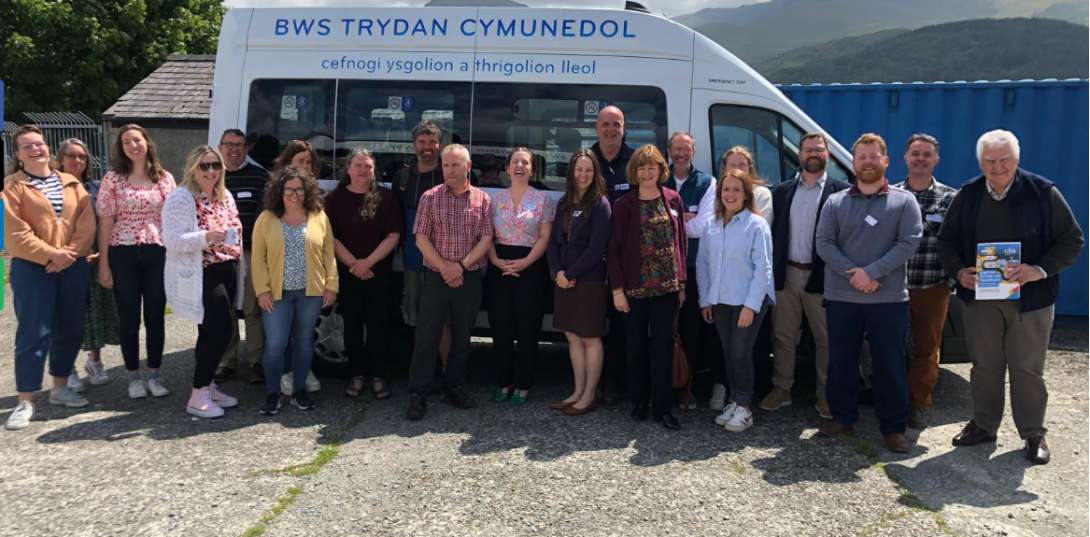
Unity is strength – enhancing Community Transport through Collaboration
“Unity is strength,” commented one of the participants at a recent event in Wales that focused on the power of partnership working.
Four organisations in north Gwynedd, Partneriaeth Ogwen, Yr Orsaf, O Ddrws i Ddrws, and Y Dref Werdd, held the event to showcase their community transport (CT) services and the added value that collaboration brings. Michelle Clarke, CTA’s Wales Transport Strategy Lead, shares some reflections on their partnership working:
Work to your strengths, as this makes collaboration easier.
It was evident from attending the event planning meetings how supportive the four partners are of each other and how clearly they can describe what makes their individual organisations unique as well as their similarities. They assigned tasks based on an understanding of each person’s expertise, which made me think about the value of this approach for creating a sense of shared ownership and a genuine appreciation of the diverse skills everyone brings.
The value of peer support is knowing that help is only a phone call away.
This is as important as sharing advice, expertise, and learning. Being part of a small peer network was enormously beneficial for the four organisations, as there was the reassurance of shared experiences and the goodwill to assist each other, whether that’s through having someone to offload stresses to or the immediate loan of a replacement vehicle in an emergency.
Funding can be unlocked through partnership bids as funders see the added value this approach brings.
The four organisations actively look for ways to collaborate on funding bids and have been successful in securing shared grants. Some funders are concerned about duplication of services and welcome proposals that emphasise the collective vision for an area and show how gaps in services are being addressed together.
Having a pool of operators working together can be a catalyst to support new CT schemes to develop.
Requests for support from other community groups who have heard about the operators’ work and want to do something similar in another part of the county can be shared amongst them. If a sole operator is receiving a number of requests for help and advice, the chances are they might not be able to respond to them all simply due to workload. Where different operators can share the requests and respond based on who might be best-placed within the pool of operators to reply to particular queries, then it can only be helpful. More financial assistance is needed for the CT sector to help facilitate this invaluable peer support approach.
Learning is accelerated.
Knowledge is being shared on an ongoing basis, in this instance, across four operators, rather than one operator accumulating knowledge on its own at a slower pace. The importance of sharing information about failures as well as successes was highlighted by the operators, as having the whole picture reveals evidence of need, data on ‘what works’, and generates ideas on how to overcome any barriers or challenges.
The operators’ values and ethos around working in partnership also apply to how they work with their local communities.
They often reflected on the importance of listening to and involving communities in developing transport solutions. By ensuring that local people have a stake in developing CT services, those same services are able to deliver what people want, to recruit volunteers for delivery or governance roles, and have credibility as community-led organisations that centre lived experience.
Co-produced services are an opportunity to have something really strong and effective.
The four organisations have an extensive track record of designing services with their communities in a way that meets local needs, ensuring their engagement processes are inclusive and accessible from the beginning. Doing this well takes time but offers a way to share power and work together as equals rather than ‘service provider’ and ‘beneficiary’, focusing on reciprocal and caring relationships.
Partnerships could be widened further beyond CT.
Such as partnering with academic bodies to help research aspects of community transport. Amy Nicholass, from the Transport and Health Integrated Research Network at Aberystwyth University, spoke at the event, and it was invaluable to hear a different perspective on the value of CT to individuals, volunteers, and rural communities. Amy’s contribution was an opportunity to ask ourselves, ‘How can we engage with partners outside of the sector to help build an evidence base that strengthens our argument that investing in community transport is also an investment in health, wellbeing and community resilience?’
Sitting in a light-filled room in a community building in Bethesda, listening to Partneriaeth Ogwen, Yr Orsaf, O Ddrws i Ddrws, and Y Dref Werdd talk passionately about helping everyone to participate in community life. Including all the activities we take for granted, I realised that unity is strength, but it is also compassion, kindness, respect for each other, and a driver for social change.
